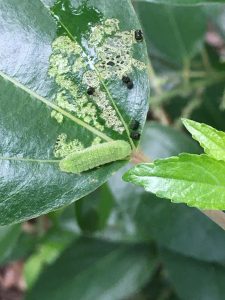Some years ago, West End local, Helen Schwencke, and Dutton Park resident, Dick Copeman, were observing cabbages growing in a garden, which were being eaten by caterpillars. They got in to a conversation on whether it might be possible to control the caterpillars by planting native plants that would bring other insects into the garden, which would, in turn, eat the caterpillars that were eating the cabbages.
A little later, goaded by mounting evidence of a serious decline in the numbers of insects around the world, Helen and Dick decided to embark on writing a book, a book that would explore the idea that planting local native plants that provide food and shelter for insects could have the double benefit of helping stem the decline of insects while also helping protect the food and other plants that we grow in our gardens from unwanted insect damage.
The fruit of their efforts is their recently published book, Inviting Nature to Dinner: The benefits of bringing biodiversity to our backyards.
Nature is at a crisis point but we can all do something about it
The living creatures with whom we share the planet are being decimated by land clearing, climate change, ecological simplification, chemicals and invasive species. We may feel powerless to challenge these global trends, but, Helen and Dick argue, we are not. This book shows how, by starting in our own gardens, we can begin to make a difference, as amply shown by Helen’s 33-year-old butterfly and wildlife garden in Roger Street, West End.
To make our gardening and food production sustainable, we need firstly to understand that all life on earth lives in complex relationships with other life and the environment, in a highly interdependent way. We then need to adjust the way we garden and grow our food so that we are working with, not against, nature and its complex relationships.
Insects comprise over two thirds of all animal species and they play key roles in the ecology of our world, including converting plants into food for other creatures. Terrestrial life on Earth is dependent firstly on sunlight providing energy for plants to produce carbohydrates and then on herbivores, mostly insects, converting the carbohydrates to proteins. These protein rich herbivores are, in turn, vital food for other animals, particularly their young. Many insects depend on specific plants to feed their larvae. By planting these local native host plants in our gardens, we can support healthy populations of insects that will not only support the whole complex web of life but will also help protect our plants from the very small percentage of insects that can adversely affect them. An added bonus is that some of these native host plants are also edible for us.
Why invite nature to dinner?
It may seem counterintuitive to ‘invite nature to dinner’ by planting plants in your garden that will encourage insects to come and eat them but that is exactly what Helen and Dick are advocating. Their idea is that if you increase the variety and numbers of insects in your garden, they will attract insects and other animals such as lizards, frogs and birds that will eat the first lot of insects. Then, if the few insects that might eat the plants that you like get out of hand, the others will be there to put them back in check.
Organic farmers and others try to do something similar by releasing so called ‘good bugs’ to control the ‘bad bugs’ that eat their crops but Helen and Dick don’t like defining ‘goodies’ or ‘baddies’. Instead, they take this strategy to a whole new level in which they use local native plants to attract native insects which will then attract other native insects, thus building a much greater level of biodiversity, which keeps the whole garden ecosystem in a state of dynamic but healthy flux.
Many common garden plants are not native to Australia. Our food plants are mostly vegetables and fruits from other countries with different climates and our favourite ornamental plants are also often imported. Most local insects are unable to eat these plants, which might appear to be a good thing, but a few generalist native insects adapt to eating them, often voraciously and in big numbers. We end up with the worst of both worlds – decimated gardens and yet no food to support most native insects.
If we add local native plants to our gardens, particularly those that are food plants for native insects, as well as those ’bushtucker’ plants that we can eat, we will make our diets more interesting and diverse, we will build up a diverse insect and plant ecology in our gardens and we will help protect our food plants from unwanted chewing.
How do you start to develop a wildlife friendly garden?
Helen and Dick outline a range of gardening strategies that will encourage native insects and other wildlife to take up residence in your garden. They include growing a diverse range of local native plants, including host plants for caterpillars and other insect larvae. Also include native flowering plants, plants with dense or prickly foliage and plants that produce a lot of seed or fruit. Other strategies include leaving old and dead branches and trees and leaf litter in place, protecting and nurturing the soil and providing water. Ensure that at least some of your native plants are edible or ‘bushtucker’ plants as well.
Before you start selecting your plants, it can help to do a bit of planning. Consider your goals for your garden, analyse your site, and sketch a plan.
How do you know which plants to plant?
The book includes beautifully illustrated vignettes of a range of local bushtucker plants that are also host plants for insects. Originally designed for Helen’s butterfly project at Woodfordia, the site of the folk festival, they have been annotated and adapted for this book. There is also an appendix listing many more plants native to south east Queensland and northern New South Wales that support insects and other wildlife and are suitable for growing in gardens and on larger properties.
Our region boasts a number of specialist nurseries that can supply these plants and these are listed in a separate appendix, and to help you prepare and cook some of the bushtucker foods, there are a couple of recipes included, with more planned for the next edition.
Observing and enjoying your garden ecology in action
Helen and Dick warn that once you start developing a wildlife friendly garden, your life will never be the same. The neighbours will be concerned when they see you standing stock still, staring at a plant for minutes at a time. The little critters that appear as if by magic will entice and entrance you. People have told them that they never look at their garden in the same way again.
You will gradually learn to identify an amazing range of creatures and you will begin to notice and understand the flow of life in your urban mini-jungle: which leaves are chewed, which flowers attract the most insects, where you can find the caterpillars and the chrysalises, when the adult insects emerge, and who eats what.
You will also learn to be a more relaxed gardener, to go with the flow and observe and monitor when some ‘pests’ seem to be getting out of hand – to wait for the arrival of lady beetles to eat the aphids, or of tiny wasps to parasitise the caterpillars that are threatening your plants, rather than reaching for the spray bottle.
Feedback wanted
This edition of Inviting Nature to Dinner is a preview edition as Helen and Dick are keen to receive feedback on their ideas and presentation, with a later, more definitive, edition planned. They would like to hear from readers and gardeners as to how the book could be improved and expanded.
Inviting Nature to Dinner is available by emailing Helen at info@earthling.com.au
You can also buy it from Avid Reader bookshop in West End or from the QLD Museum bookshop. RRP $32.
See Helen’s website at https://earthling.com.au/inviting-nature-to-dinner/
Dick Copeman has been a doctor, environmental activist and permaculture practitioner and teacher. He has been involved at Northey Street City Farm at Windsor since its foundation in 1994 and currently leads a volunteer group that looks after the farm’s forest gardens, orchards and bush tucker plots.
All images supplied. Feature Image, Fiddler beetle (Eupoecila australasiae) and native bees on corymbia intermedia





